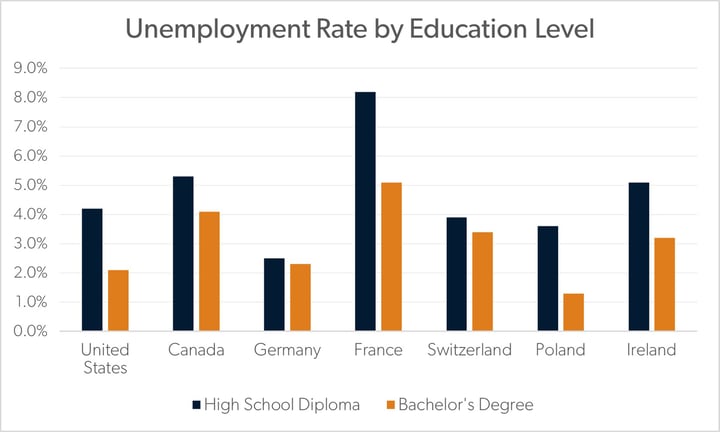Skills-Based Hiring Is the Future
The post-pandemic recovery period brought an unprecedented demand for talent, contributing to intense talent shortages on a global scale. While the labor market has since cooled, organizations continue to struggle to find the right talent, and more and more companies are beginning to transition away from degree requirements and toward skills-based hiring – evaluating job applicants based on demonstrated skills and competencies rather than degree completion.
A Harvard Business Review article predicts this shift to skills-based hiring will open opportunities to a large population of potential employees who in recent years have often been excluded from consideration due to “degree inflation.” This trend, in which employers add degree requirements to the descriptions of jobs that hadn’t previously required degrees – even though the jobs themselves hadn’t changed – became pronounced after the Great Recession of 2008-2009.
At that time, the number of job postings requiring a college degree peaked, and today, 44% of recent job postings require a bachelor’s degree. Degree requirements exclude many capable individuals from positions for which they are otherwise qualified, and as talent shortages persist, many organizations are moving away from this practice and instead focusing on the skills required to get a particular job done.
Major companies including IBM, Dell, Bank of America and Google have dropped degree requirements, while the state governments of Alaska, Maryland, Pennsylvania and Utah in the US have relaxed requirements for public jobs in response to talent shortages. And as talent shortages persist into the future, skills-based hiring will likely continue to rise in popularity.

Sources: Bureau of Labor Statistics (US), Eurostat (Europe), and StatCan (Canada)
Skills-Based Hiring Is Not a New Phenomenon
Despite the attention skills-based hiring has received in recent years, employers have been moving away from degree requirements for some time now. A study conducted by the Burning Glass Institute found that degree requirements were relaxed from 46% of middle-skill jobs and 31% of high-skill jobs between 2017 and 2019. The State of Skills-Based Hiring 2022 report from TestGorilla shows 76% of employers use some skills-based hiring to find new talent, with nearly 55% using role-specific skill sets.
This shift to skills-based hiring is also punctuated by the fact that a growing number of professionals do not require degrees to perform their jobs. Over the past two years, LinkedIn has reported a 21% increase in job postings in the US with skills and responsibilities touted instead of qualifications. Further, 1 in 4 companies that use pre-employment assessments plan to increase their use of them over the next five years; and of those who don’t utilize such tests, 1 in 10 plan to start, according to a recent SHRM survey.
Relaxing Degree Requirements Broadens the Talent Pool
Degree requirements can place companies at a competitive disadvantage. College degrees are not necessarily indicative of a candidate’s ability to perform a role, and requiring a college degree shuts out qualified candidates whose skillset aligns to the role. Compared to individuals with a bachelor’s degree or equivalent, individuals with only an upper secondary education have a higher unemployment rate, but the lack of a degree does not necessarily indicate a lack of skill. Many individuals obtain valuable experience through community college, military service and on-the-job experience, and they have the necessary skills to perform roles they might otherwise be disqualified from due to a lack of a bachelor’s degree.
Opening up your talent search to a broader pool of workers is a clear advantage of skills-based hiring. Particularly when top talent in many industries is scarce, this approach can reap benefits – even beyond the private sector. For example, in May 2022, the state of Maryland announced it would remove four-year college degree requirements for almost 50% of its positions. Shifts such as this push the envelope toward allowing qualified, non-degreed candidates to be considered for opportunities.
Retraining Hiring Managers is Essential
In a survey conducted by General Assembly, 90% of hiring managers state that they are extremely, very or somewhat concerned that current recruitment strategies will not be enough to fill open tech positions, but only 23% of hiring managers have revised job requirements to be more inclusive of individuals without college degrees. Embracing hiring strategies that include on-the-job training, apprenticeships and hiring from training boot camps all broaden the pool of available talent. At the same time, it is also essential that hiring managers receive training and are provided with tools such as evaluation rubrics that can help prevent bias towards candidates with degrees.
A recent AGS article on transforming your workplace through managing diversity, equity and inclusion (DEI) highlights the importance of hiring managers building inclusive job descriptions that focus on tasks and skills that suit the work that needs to be done. For example, the job description could ask for a person with a high level of organizational skills and the ability to clearly communicate work that needs to be done instead of saying you want someone who has been a project manager. By focusing on the skills in the job description, companies benefit from a broader selection of qualified candidates – some that may not have been considered if an organization was only looking to place someone who held the same or a similar title.
Recognizing the need to shift the process of talent acquisition, many organizations are moving towards a skills-based workforce recruitment model. A skills-based workforce acquisition model focuses on establishing the skills requirements and expectations for the work demand that they are trying to fulfill and then assessing candidates from across all worker categories, according to a recent AGS article.
Moving to Skills-Based Hiring
Implementing cutting-edge talent practices is more critical than ever. Moving away from degree requirements in job descriptions and toward skills-based hiring is one way your organization can approach filling essential roles in an increasingly competitive job market. You can broaden your talent pools by retraining hiring managers to focus on skills-based job descriptions and investing in skills-based workforce recruitment models.
To learn more about these best practices and how we can help, reach out to your local AGS representative.
-min.png)





